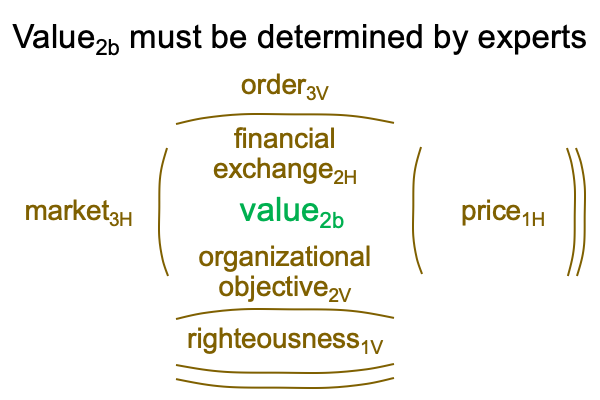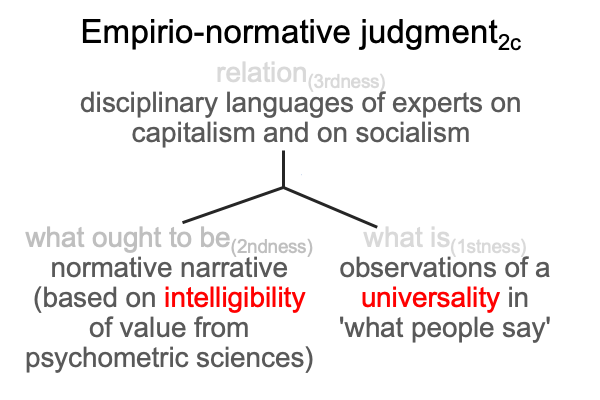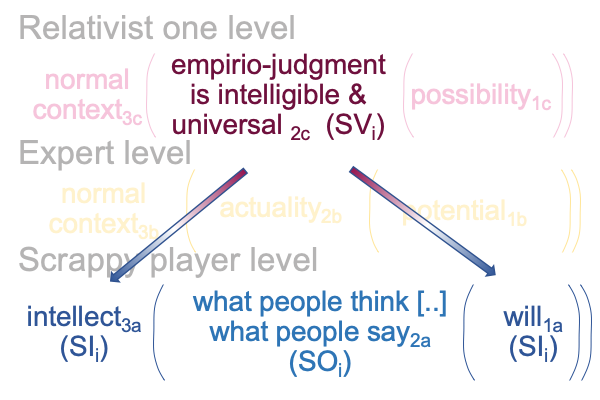0476 Chapter one is titled, “The Goldman Rule”.
At first, I thought, “He can’t be talking about a gold man.”
Or maybe, he refers to a god man.
0477 The title calls to mind some ancient civilization, who has a king, blessed by a god with a particular trait. Everything that he touches turns to gold. Such a story is easy to debunk as scientifically impossible.
But, one lesson, “He who has the gold makes the rules.”, is not so easy to refute, and leads to an awkward corollary, “He who makes the rules gets the gold.”
0478 The same type of circularity is on display at the heart of the psychometric sciences.

He who controls the financial exchanges2H, makes the organizational objectives2V.
He who makes the organizational objectives2V, will get to control financial exchange2H.
0479 By the way, have you heard about the value2b of central-bank digital currency?
Just asking.
0480 Through the hybridization of capitalist and socialist expertise, reformatted into an image of empirio-schematic science, the market3H can manifest the potential of righteousness1V, not directly, but indirectly, through value2b. Similarly, sovereign power can potentiate order1V capable of nudging prices1H, not directly, but indirectly, through value2b.
That means that the capitalist gold man and the socialist god man find opportunity1c in modeling values2b that lead to actionable judgments2c for the one of scientism3c.
0481 Here is a picture of an empirio-normative judgment.

The specialized disciplinary languages of experts on capitalism and socialism (relation, thirdness) brings a normative narrative, exhibiting the intelligibility of value from the psychometric sciences (what ought to be, secondness), into relation with observations of a universality in what people say, corresponding to phenomena salient to the psychometric sciences (what is, firstness).
0482 Two crucial qualifiers are depicted in red.
The psychometric model, the normative narrative, and what ought to be need to exhibit intelligibility. Since this element is imbued with secondness, it should be intelligible enough to enter the slot for actuality2 when the actionable judgmentunfolds into a category-based nested form. Intelligibility must seem real.
Observations and measurements of phenomena of what people say, corresponding to what is, need to seem universal,rather than biased, selective or conjured out of thin air. No scientist would dare say, “I made up the phenomena that I observed and measured.” Contemporary marketers and journalists take note. You are experts in the psychometric sciences. You cannot make up what people are saying in order to show that your models of value2b are supported by data.
0483 For the scientismist one3c, the empirio-normative judgment2c offers the opportunity1c to broadcast an interventional sign-vehicle (SVi) to be received by a sign-interpretant consisting of the reason3a,1a of people on the scrappy-player level (SIi).

0484 The resulting interventional sign-object (SOi) is what people think [that may or may not be objectified as] what people are willing to say. Individuals say what they think. Stakeholders say what they feel that they are being told to think.
0485 This brings me to the introduction of Ramaswamy’s book.
In the very first statement, Vivek Ramaswamy proclaims himself to be a traitor to his class.
What does this mean?
0486 Ramaswamy is an individual. Individuals stand before God.
His class are stakeholders. Stakeholders objectify the interventional sign-vehicles broadcast by the Forum for Universal Contemporary Knowledge and Unified Practices. Stakeholders stand before the dominating deity of the Fourth Battle of the Enlightenment Gods and proclaim, “We submit!”
